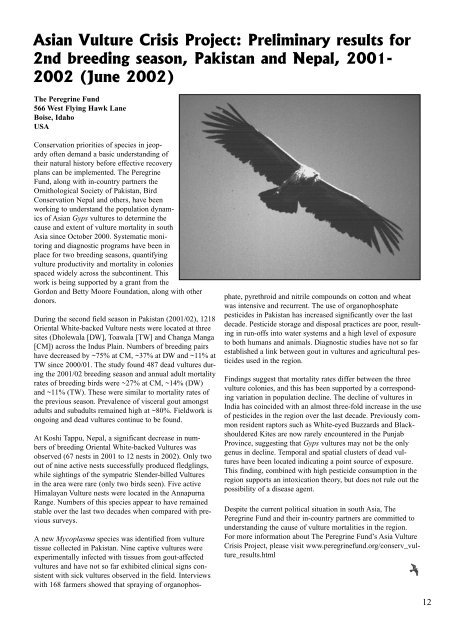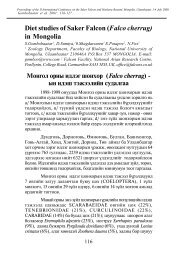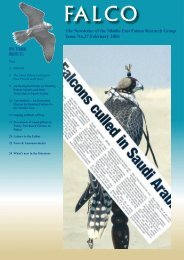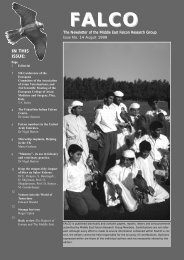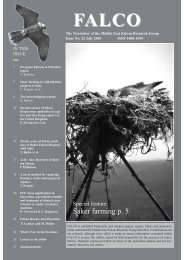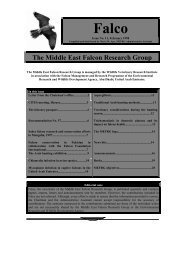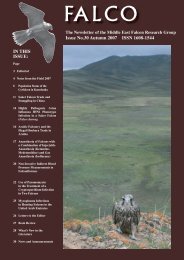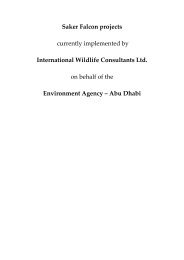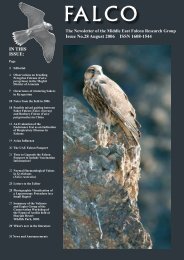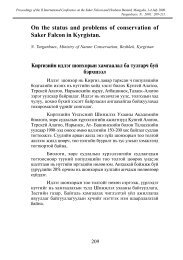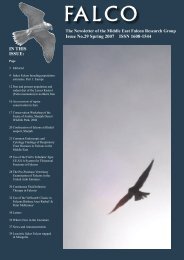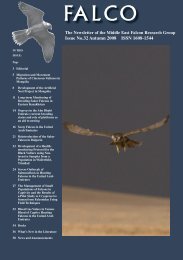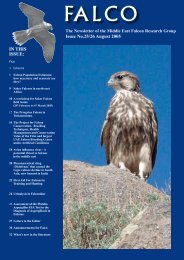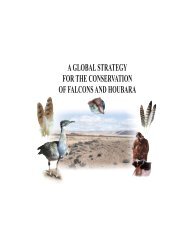Another method of investigation we are pursuing, thatcould be very helpful with our studies, is the comparisonof blood samples from the affected wild vultures inIndia with those of vultures not affected by the declines.Samples from wild-caught Indian vultures now in captivitywould be particularly useful in this respect. We areparticularly interested in receiving serum samples fromclinically healthy old-world vultures (captive or wild).These samples will be stored frozen at the Institute ofZoology, London and kept for use by diagnostic andresearch laboratories investigating the vulture disease inIndia, should such samples prove useful. Comparisonsbetween serum samples collected within and outside Indiamay help us to identify the causative agent. For example,if putative infectious agents are found during the courseof our investigations, the samples would be tested for evidenceof antibodies to that agent and the results comparedwith serum samples collected from the affected vulturesin India. Further details of how to participate with theserum collection can be found on the relevant page of thevulture project web site (www.vulturedeclines.org).The dramatic vulture declinesobserved across India present awhole range of threats, both ecologicallyand to human health.The absence of such importantscavengers will almost certainlyinfluence the numbers and distributionof other scavenging species.For example, as vultureshave declined feral dog populationshave been reported to haveincreased massively, with over1,000 observed recently at acarcase dump in Rajasthan - thiscould pose many associated diseaserisks to humans and wildlife,such as rabies.Himalayan GriffonThe international implicationsof this problem are also veryconcerning. If it is an infectiousdisease that is affecting the tworesident Gyps spp. of vulture inIndia, it is conceivable that it willspread beyond the Indian borders.The ranges of species of the Gyps genus overlap fromIndia through central Asia and the Middle East to SouthAfrica and Western Europe. Griffon vultures are knownto travel widely and it is possible that a disease of Gypsspp. vultures could spread from South Asia throughoutthe old world. Already, there are reports of dead vulturesand population declines in Pakistan and Nepal. Whilethese reports are also of Indian white-backed and longbilledvultures, other Gyps species may also be at risk.Particularly worrying in this respect are recent reportsfrom Dr Prakash of finding small numbers of sick anddead Eurasian griffons Gyps fulvus and Himalayan griffonsGyps himalayenisis on their wintering grounds inIndia.The Birdlife network has been used to alert bird conservationorganisations in all of the Gyps spp. range states ofthe problem. We are encouraging organisations throughoutrange states to closely monitor vultures in their areas.In order to allow comparable results from different countries,standard methods for monitoring and surveillancehave been developed and published on the vulture projectweb site (www.vulturedeclines.org). Further informationabout the project may also be found on this web site.If you would like to support this work financially or inany other way, or if you would like advice or help to startwork on monitoring vultures in your area, please contactus.For pathological investigations and collectionof serum samples: Dr Andrew Cunningham -andrew.cunningham@ioz.ac.ukFor monitoring within India : Dr Vibhu Prakash - jatayu_prakash@yahoo.co.inFor monitoring outside India: Dr Debbie Pain -debbie.pain@rspb.org.uk96, 365-378.References:Oaks, L. (2001) Summaryof Diagnostic Investigationinto Vulture Mortality: PunjabProvince, Pakistan, 200-2001.Reports from the workshop onIndian Gyps vultures. In: Katzner,T., Parry-Jones, J., (Eds.), 4thEurasian Congress on Raptors,Seville, Spain. Estación BiológicaDonaña, Raptor ResearchFoundation, pp. 12-13. Documentcan be downloaded fromwww.vulturedeclines.org. See also: http://www.peregrinefund.org/conserv_vulture_results.html.Prakash, V. (1999) Status of vulturesin Keoladeo National Park,Bharatpur, Rajasthan, with specialreference to population crashin Gyps species. Journal of theBombay Natural History Society,Rahmani, A. R. & Prakash, V. (Eds.) (2000) Brief reporton the <strong>International</strong> Seminar on the Vulture Situation inIndia. 18-20 September 2000. Bombay Natural HistorySociety, Hornbill House, Mumbai, India.Prakash, V. et al. (in press) Catastrophic collapseof Indian white-backed Gyps bengalensis and longbilledGyps indicus vulture populations. BiologicalConservation.11
Asian Vulture Crisis Project: Preliminary results for2nd breeding season, Pakistan and Nepal, 2001-2002 (June 2002)The Peregrine Fund566 West Flying Hawk LaneBoise, IdahoUSAConservation priorities of species in jeopardyoften demand a basic understanding oftheir natural history before effective recoveryplans can be implemented. The PeregrineFund, along with in-country partners theOrnithological Society of Pakistan, BirdConservation Nepal and others, have beenworking to understand the population dynamicsof Asian Gyps vultures to determine thecause and extent of vulture mortality in southAsia since October 2000. Systematic monitoringand diagnostic programs have been inplace for two breeding seasons, quantifyingvulture productivity and mortality in coloniesspaced widely across the subcontinent. Thiswork is being supported by a grant from theGordon and Betty Moore Foundation, along with otherdonors.During the second field season in Pakistan (2001/02), 1218Oriental White-backed Vulture nests were located at threesites (Dholewala [DW], Toawala [TW] and Changa Manga[CM]) across the Indus Plain. Numbers of breeding pairshave decreased by ~75% at CM, ~37% at DW and ~11% atTW since 2000/01. The study found 487 dead vultures duringthe 2001/02 breeding season and annual adult mortalityrates of breeding birds were ~27% at CM, ~14% (DW)and ~11% (TW). These were similar to mortality rates ofthe previous season. Prevalence of visceral gout amongstadults and subadults remained high at ~80%. Fieldwork isongoing and dead vultures continue to be found.At Koshi Tappu, Nepal, a significant decrease in numbersof breeding Oriental White-backed Vultures wasobserved (67 nests in 2001 to 12 nests in 2002). Only twoout of nine active nests successfully produced fledglings,while sightings of the sympatric Slender-billed Vulturesin the area were rare (only two birds seen). Five activeHimalayan Vulture nests were located in the AnnapurnaRange. Numbers of this species appear to have remainedstable over the last two decades when compared with previoussurveys.A new Mycoplasma species was identified from vulturetissue collected in Pakistan. Nine captive vultures wereexperimentally infected with tissues from gout-affectedvultures and have not so far exhibited clinical signs consistentwith sick vultures observed in the field. Interviewswith 168 farmers showed that spraying of organophos-phate, pyrethroid and nitrile compounds on cotton and wheatwas intensive and recurrent. The use of organophosphatepesticides in Pakistan has increased significantly over the lastdecade. Pesticide storage and disposal practices are poor, resultingin run-offs into water systems and a high level of exposureto both humans and animals. Diagnostic studies have not so farestablished a link between gout in vultures and agricultural pesticidesused in the region.Findings suggest that mortality rates differ between the threevulture colonies, and this has been supported by a correspondingvariation in population decline. The decline of vultures inIndia has coincided with an almost three-fold increase in the useof pesticides in the region over the last decade. Previously commonresident raptors such as White-eyed Buzzards and BlackshoulderedKites are now rarely encountered in the PunjabProvince, suggesting that Gyps vultures may not be the onlygenus in decline. Temporal and spatial clusters of dead vultureshave been located indicating a point source of exposure.This finding, combined with high pesticide consumption in theregion supports an intoxication theory, but does not rule out thepossibility of a disease agent.Despite the current political situation in south Asia, ThePeregrine Fund and their in-country partners are committed tounderstanding the cause of vulture mortalities in the region.For more information about The Peregrine Fund’s Asia VultureCrisis Project, please visit www.peregrinefund.org/conserv_vulture_results.html12


